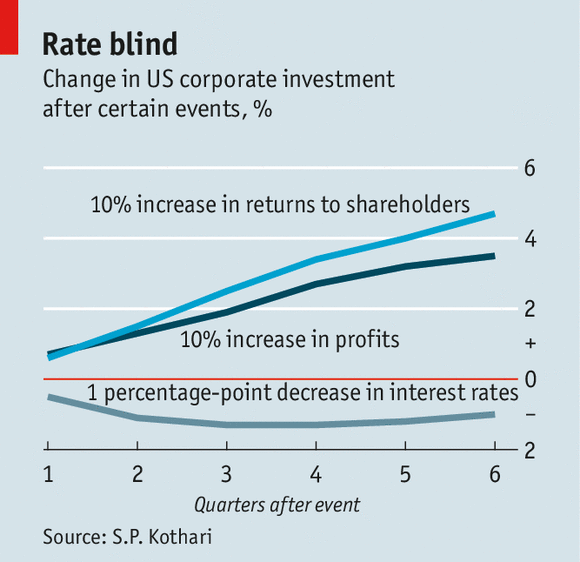The Economist magazine
recently ran an article detailing some surprising results of a paper published
by three finance researchers from MIT, Dartmouth and the University of
Rochester.
From the Economist:
IT IS Economics 101. If central bankers
want to spur economic activity, they cut interest rates. If they want to dampen
it, they raise them. The assumption is that, as it becomes cheaper or more
expensive for businesses and households to borrow, they will adjust their
spending accordingly. But for businesses in America, at least, a new study* suggests that the
accepted wisdom on monetary policy is broadly (but not entirely) wrong.
What surprised the Economist was that a
decrease in interest rates actually caused a decline in capital spending:

While this was counterintuitive to
Keynesian trained analysts, it is not for those versed in Austrian economics.
Occasionally,
we all may have a burst of real insight into a situation that doesn’t jibe with
conventional wisdom. With regard to Austrian Business Cycle
Theory, mine came while reading the Roger Garrison summary of The AustrianTheory of the Trade Cycle:
On page 114 Garrison drew a simple supply and demand graph
of loanable funds (savings). He showed that as you dropped interest rates
artificially, via Fed money printing, the level of loanable funds would fall.
It was a simple and elegant insight, yet it was extremely radical in
terms of traditional economic thought. The Keynesians were, I realized then and
there, entirely wrong. Money creation from thin air was not neutral to the
capital structure of the economy, but had profound impacts. It changed
everything for me.
So, now that some
traditional economic platforms are starting to understand that the real world
doesn’t act in a way that Keynesian economics would predict, what should we
expect to see happen? I am going to go along with Winston Churchill on this
one:
Men occasionally stumble over the truth, but most of them pick themselves up and hurry off as if nothing ever happened.
Men occasionally stumble over the truth, but most of them pick themselves up and hurry off as if nothing ever happened.
Disclaimer:
Nothing on this site should be construed as investment advice. It is all merely
the opinion of the author.
No comments:
Post a Comment